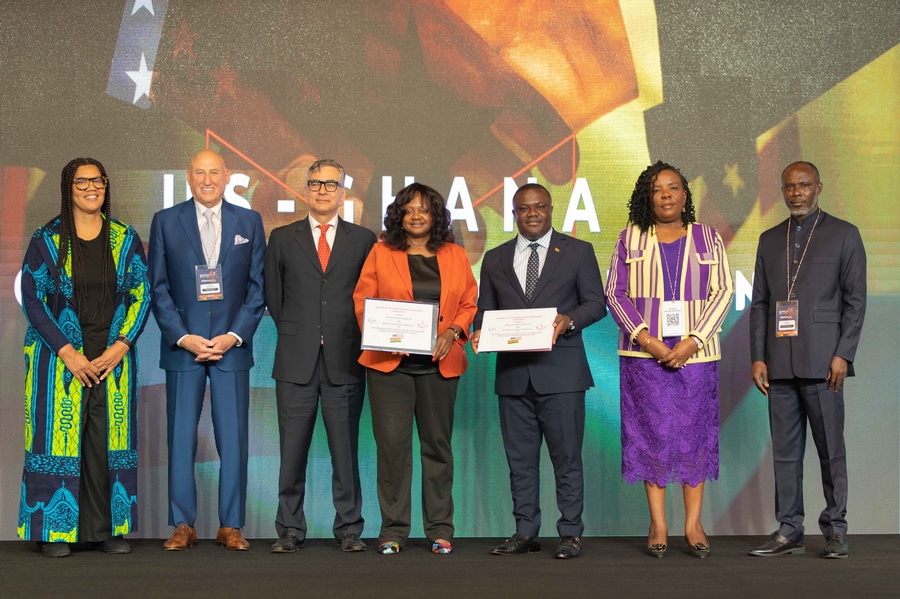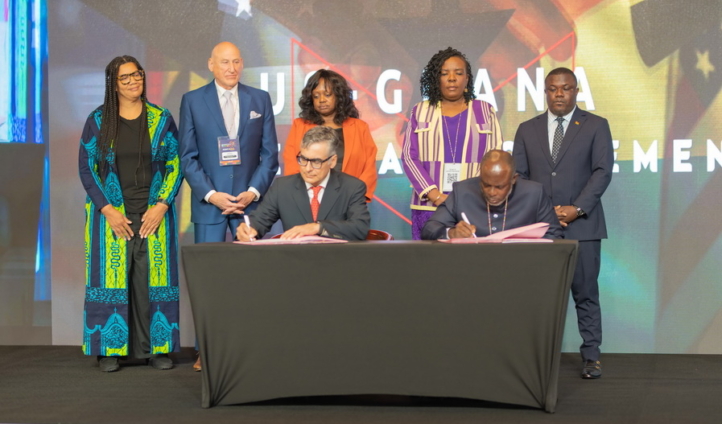Ghana on Thursday took a major step in its pursuit of nuclear energy as a key component of national energy mix, when Nuclear Power Ghana and the U.S.-based Regnum Technology Group signed a landmark nuclear cooperation agreement.
The agreement, unveiled at the second United States-Africa Nuclear Energy Summit in Nairobi, Kenya, marks a significant move towards strengthening energy security in Africa, according to Deputy Minister of Energy, Collins Adomako Mensah.
Persons with knowledge of the agreement tell Myjoyonline that Regnum Technology Group will seek funding for the construction of the nuclear plant and also commit to take up a chunk of the electricity to be generated.
Adomako Mensah, while addressing the Summit, stated that “Energy is the heartbeat of every economy,” and pointed out the critical need for Africa to secure sufficient energy to support economic and social development.
According to him, without adequate energy, the welfare of the continent’s citizens would be at risk and that “It’s important that the African continent has enough of it to support economic and social development and to enhance the welfare of its citizenry.”
Adomako Mensah recalled that since 2005, Ghana has been carefully planning the integration of nuclear power into its energy mix, recognising it as a vital pathway for the country’s energy transition.

The Deputy Minister highlighted a recent development in this journey, telling the summit that on September 13, 2023, the U.S. reaffirmed its commitment to support Ghana in establishing itself as a regional training hub and Centre of Excellence for Small Modular Reactors (SMRs) in the Sub-Saharan African region.
He said the collaboration is expected to have far-reaching impacts, not just for Ghana but for the entire West African region.
“The production of adequate electrical power through clean base load technology such as nuclear will serve as a strong backbone for the West African power pool,” said Adomako Mensah, emphasising the broader regional benefits of Ghana's nuclear ambitions.
“The signing of the cooperation agreement between Nuclear Power Ghana and Regnum Technology Group for the adoption of NuScale’s innovative small modular reactor technology in an industrial enclave is seen as a milestone achievement in Ghana-U.S. cooperation for the peaceful use of atomic energy,” he said, pointing out the importance of the principles guiding the partnership, saying that it is based on “equity and mutual benefits to both countries.”
Read also: "Why Not Africa?" NEA Director-General calls for Africa’s inclusion in global nuclear future
Partnership marks major milestone
The US Under-Secretary for Arms Control and International Security, Ambassador Bonnie Denise Jenkins, underscored the significance of the partnership for Ghana and the broader African continent.
“I am very thrilled to be here today to celebrate a major milestone in the US-Ghana civil nuclear partnership,” Ambassador Jenkins said, noting also that the agreement, centered on NuScale Power technology, positions Ghana as a leader in the development of small modular reactors (SMRs) in Africa.
Ambassador Jenkins spoke of the transformative potential of SMRs, noting that they “stand out as a transformative technology that can meet a range of needs.”
She emphasised the versatility of these reactors, which, with their small land footprint and scalable size, are poised to revolutionise energy access across the continent.
“They can jumpstart clean, reliable energy access for today’s industries, hospitals, and schools,” she said, underlining the immediate and far-reaching impacts of the technology.
The agreement not only aims to bolster Ghana’s energy infrastructure but also to establish the country as a supply chain hub, catalysing economic development and job creation in the region.
“This partnership will position Ghana to lead on the development of small modular reactors in Africa, establish itself as a supply chain hub, and catalyse economic development and jobs creation in the region.”
Denise Jenkins also touched on the broader implications of the agreement for sustainable development, expressing her excitement about the promise it holds for building a more sustainable future.
“We are very excited with the promise of these technologies for building a more sustainable future,” she said, reinforcing the role of nuclear energy in driving long-term environmental and economic goals.
Dr Stephen Yamoah, the Executive Director of Nuclear Power Ghana, and Saladin Amery, CEO of Regnum Technology Group led their respective teams to sign the deal.
Latest Stories
-
It’s propaganda, Ken Agyapong will win – Stephen Amoah fires Bawumia camp over MP endorsements
2 hours -
Ahafo RCC and Netcentric Campaigns donate sanitary pads, learning materials to 500 girls to promote menstrual hygiene
2 hours -
Ghana showcases clean energy progress with a visit to an innovative e-bike manufacturer
2 hours -
Volta Regional Minister deepens stakeholder engagement in Ketu South, inspects site for modern market project
2 hours -
Inspired by her late mother, Asante Mampong businesswoman champions grassroots development
2 hours -
WiLDAF launches empowerment initiative for women agri-food traders along Ghana-Togo border
2 hours -
Bryan Acheampong camp unfazed by 60 MPs show of support for Dr Bawumia – Aide
2 hours -
NPP needs a strong party to produce a president, not just a flagbearer – Patrick Boamah
3 hours -
Fitch Solutions revises Ghana’s average inflation in 2025 to 17.2% – Fitch Solutions
3 hours -
Fitch Solutions revises Ghana’s growth rate upwards to 4.9% in 2025
3 hours -
Africa World Airlines expands regional operations to Ouagadougou from July 1
3 hours -
The 60 MPs believe Bawumia is NPP’s best bet for 2028 – Dominic Nitiwul
3 hours -
Frederick Asare parts ways with Asante Kotoko
4 hours -
97% of agencies faced major creative campaign challenges -PMI Survey
4 hours -
Yaw Nsarkoh calls for overhaul of political parties to safeguard Ghana’s democracy
4 hours

